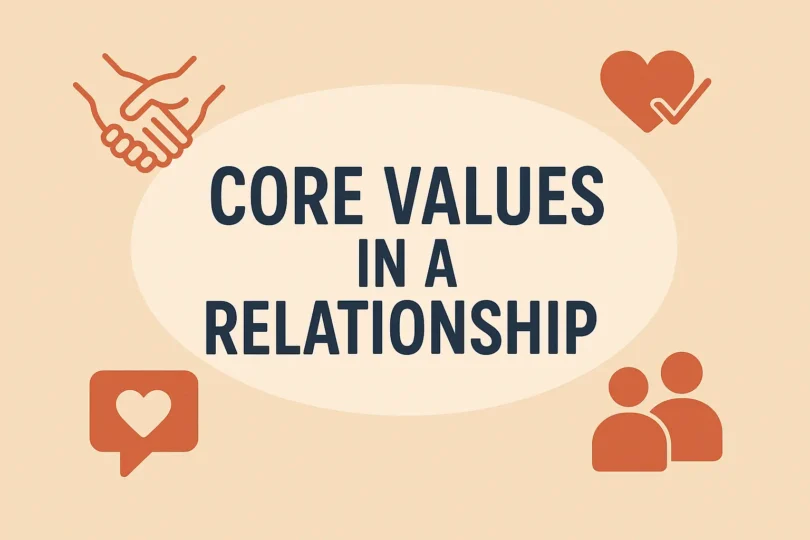Every couple wants love that lasts—but lasting love doesn’t just happen by chance. It’s built on something deeper than chemistry or attraction. At the heart of every strong and healthy relationship are core values in a Relationship—those fundamental beliefs that shape how we think, act, and connect with others.
Core values in a Relationship are like the compass guiding your relationship. They influence how you communicate, how you handle conflict, how you grow together, and how you show up for each other when things get hard. When two people share the same values, they create a powerful emotional bond that helps them feel understood, respected, and safe.
Whether it’s trust, honesty, respect, or shared life goals, knowing what truly matters to both of you can make all the difference. Because when values align, love becomes more than a feeling—it becomes a partnership with purpose.
Headlines
The Foundation of Healthy Relationships
- Why Core Values in a Relationship Matter More Than Chemistry
- How Shared Values Strengthen the Emotional Bond
10 Core Values in a Relationship Every Couple Should Share
Growing Together Through Shared Values
The Foundation of Healthy Relationships
Healthy relationships are the foundation of emotional and social stability. Building a strong relationship requires more than just good communication; it demands a deep understanding of trust, mutual respect, and the ability to navigate challenges together. In this section, we will explore the key foundations of a healthy relationship and how to nurture them to create a supportive and lasting bond.
Why Core Values in a Relationship Matter More Than Chemistry
Sure, sparks and butterflies are exciting—but they don’t build a lasting relationship on their own. Chemistry might bring two people together, but core values in a Relationship are what keep them aligned when the honeymoon phase fades and real life steps in.
Think of it like this: chemistry is the fire, but core values in a Relationship are the wood that keeps it burning. You can be wildly attracted to someone and still find yourself clashing over the things that actually shape a life—things like honesty, goals, family beliefs, financial habits, or even how you handle conflict.
When couples share core values, they naturally understand and respect each other’s decisions, behaviors, and emotional needs. It creates a sense of stability and predictability—two underrated ingredients for long-term love.
Without shared values, even the strongest chemistry can eventually lead to misunderstanding, resentment, or emotional distance. For example, one partner may value freedom and spontaneity while the other thrives on routine and planning. Without compromise or shared understanding, this mismatch can feel like an emotional tug-of-war.
Core values in a Relationship work like a compass. They guide your relationship in the same direction. Whether it’s how you raise children, deal with money, or support each other in tough times—shared values make those decisions easier and more harmonious.
So yes, chemistry can light the spark. But if you want to keep the fire going for the long haul, core values in a Relationship are what truly matter.
How Shared Values Strengthen the Emotional Bond
At the heart of every strong relationship lies a deep, invisible thread: emotional connection. And that connection becomes stronger—more secure, more genuine—when both partners share the same core values in a Relationship.
When you and your partner see the world through a similar lens, it’s easier to build a sense of “we” instead of “me vs. you.” You’re not just coexisting—you’re co-creating a life that aligns with what matters most to both of you. Whether it’s the value you place on honesty, the importance of loyalty, or your shared belief in growing together, these values create a safe emotional space where both people feel seen, heard, and supported.
Shared values also reduce the chances of frequent misunderstandings. If both of you prioritize respect, for example, disagreements are less likely to spiral into hurtful fights. Instead, you approach conflict with a mutual commitment to understanding rather than winning. That alone can be a game-changer.
Let’s not forget how empowering it feels when your partner gets you—not just because they’re sweet or charming, but because they genuinely live by similar principles. When your values align, your love feels grounded, not just passionate. You feel like you’re building something meaningful together, not just chasing fleeting feelings.
In the long run, it’s those shared values—respect, empathy, honesty, support—that create emotional safety. And emotional safety? That’s where true intimacy grows.
Because at the end of the day, love is not just about how you feel about each other—it’s about how you treat each other. And how you treat each other is guided by the values you share.
10 Core Values in a Relationship Every Couple Should Share
Every relationship is unique, but the strongest ones often share a solid foundation built on core values in a Relationship. These values act as guiding principles—little signposts that help couples navigate the good times, the tough moments, and everything in between.
When both people hold similar values, it becomes easier to communicate, resolve conflict, support each other, and grow together. It’s not about being identical—it’s about being aligned where it truly counts. Here are 10 core values in a Relationship every couple should consider sharing to build a healthy, lasting relationship:
1. Trust
Without trust, love becomes shaky. Trust is the backbone of emotional safety and intimacy. It allows both partners to feel secure and open with one another.
Recomended: The Power of True Intimacy: Why We Need More Than Just Physical Connection
2. Honesty
Being truthful—even when it’s hard—builds respect and deeper understanding. Honesty isn’t just about avoiding lies; it’s about being real with your thoughts, feelings, and intentions.
3. Communication
Clear, kind, and consistent communication is how couples solve problems and stay connected. It’s not just what you say—it’s how you listen, too.
4. Respect
Mutual respect means honoring each other’s boundaries, values, and differences. Even when opinions differ, respect keeps the conversation constructive and the connection strong.
5. Empathy
Empathy allows you to step into your partner’s shoes and respond with compassion. It’s the bridge that turns misunderstandings into deeper emotional connection.
6. Commitment
Commitment goes beyond staying together—it’s about choosing each other every day, showing up, and investing in the relationship’s growth.
7. Shared Goals
Whether it’s career dreams, family planning, or personal growth, shared goals give your relationship direction and purpose.
8. Boundaries
Healthy boundaries aren’t walls—they’re guidelines that protect your individuality and support mutual respect. Knowing and respecting each other’s limits fosters harmony.
9. Support
Loving someone means being their biggest cheerleader. Support shows up in tough times, in celebrations, and in the little everyday moments.
10. Forgiveness
No one is perfect. The ability to forgive—and to grow from mistakes—keeps resentment from poisoning the bond you’ve built together.
Sharing these values doesn’t mean you’ll never argue or disagree. But it does mean you’ll have a shared foundation to come back to—a deeper understanding that helps you weather storms and celebrate victories together.
Growing Together Through Shared Values
Growing together through shared values is the foundation of a successful and lasting relationship. When partners embrace a set of values that bind them, it becomes easier to foster mutual understanding and respect. Shared values not only enhance communication and cooperation but also help overcome challenges together. In this section, we will explore how to build and nurture strong relationships through the sharing of values that lead to mutual growth and flourishing.
Commitment and Boundaries
It’s easy to say “I’m all in,” but true commitment in a relationship is shown through action—especially when things aren’t easy. Real commitment means showing up even on the messy days, when life feels overwhelming or when your partner’s mood isn’t sunshine and rainbows. It’s a quiet promise to stick together, grow together, and work through things as a team.
But here’s the twist: being fully committed to someone doesn’t mean losing yourself in the process. That’s where boundaries come in.
Healthy boundaries actually strengthen commitment. They’re not walls to keep your partner out—they’re more like a blueprint for how to love each other better. Boundaries say, “This is who I am, and this is how I need to be treated.” They create a space where both partners feel safe, respected, and free to be themselves.
For example, being committed doesn’t mean saying yes to everything. Maybe one of you needs alone time to recharge, or space to pursue personal goals. When those needs are clearly communicated and honored, resentment doesn’t build—and the connection deepens.
Think of commitment as the heart, and boundaries as the healthy rhythm that keeps it beating strong. Together, they create a relationship where love isn’t just about holding on—it’s about holding space for each other’s individuality while moving forward together.
A relationship with no commitment can feel unstable. A relationship with no boundaries can feel suffocating. But when the two are balanced, you get a partnership built on trust, freedom, and lasting emotional connection.
Respect and Support
In any healthy relationship, respect is the root, and support is the sunlight that helps love grow. Without these two values, even the most passionate connections can wither over time.
Respect in a relationship means more than just being polite or avoiding harsh words. It’s about valuing your partner’s thoughts, opinions, dreams, and even their differences. You might not always agree, but you recognize that they have the right to see the world differently. When both people feel respected, they feel safe being themselves—and that kind of safety is what opens the door to true intimacy.
Respect also shows up in the little moments: not interrupting when your partner is speaking, honoring their boundaries, and treating them as an equal. It’s giving space when needed, listening without judgment, and choosing kindness even when emotions run high.
Now let’s talk about support—the glue that holds couples together through ups and downs. Support means standing beside your partner, not in front or behind them. It means encouraging their growth, cheering for their goals, and offering a shoulder when they’re low. Support doesn’t always require solutions—sometimes it just means being fully present.
The beautiful thing is that support and respect work hand in hand. When you respect your partner, you naturally support their journey. And when you support someone, you’re showing them they matter—that their needs, feelings, and success are important to you.
Together, respect and support create an emotional safety net, a foundation where love feels nurturing instead of draining. It’s what transforms a relationship from simply being in love to being deeply connected.
In the end, relationships that thrive aren’t just about romantic sparks or perfect dates. They’re about two people who choose to build a life around shared values—values that reflect who they are and who they want to become together.
Taking time to explore, understand, and align your core values in a Relationship with your partner isn’t just helpful—it’s essential. It lays the groundwork for deeper trust, better communication, and a stronger emotional connection that can stand the test of time.
So, whether you’re just starting out or looking to strengthen an existing bond, make core values in a Relationship a part of your love story. Because when your relationship is rooted in the right values, you’re not just loving each other—you’re building something real, meaningful, and beautifully enduring.
Recomended: Relationship Counseling: How It Can Transform Your Love Life.








Leave a Comment